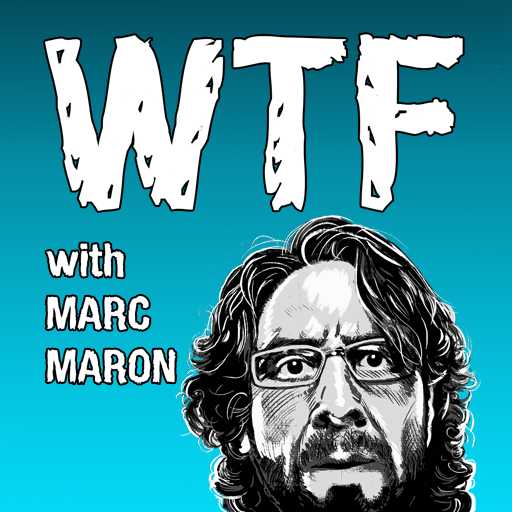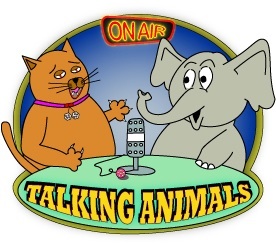Marc Maron’s WTF: Celebrated Podcast Celebrates Real, Candid Conversation
By Duncan Strauss
Host, ‘Talking Animals,’ at NPR affiliate station WMNF-FM, Tampa, Florida; online at www.talkinganimals.netIn the last several months, Marc Maron’s podcast WTF (which stands for exactly what you think) has landed a major Sunday New York Times feature, was spotlighted in Rolling Stone, covered on NPR and profiled in Entertainment Weekly, but while the program hasn’t exactly been underexposed, it might well be underappreciated.
That is, as celebrated as the show has become, Maron’s podcast has primarily been touted as an engaging show featuring a comedian interviewing comedians in a way that’s fascinating to comedy fans. The headline over the New York Times piece was “The Comic Who Explores Comedy’s Dark Side.”
All those things are true, but I feel that frames WTF far too narrowly—I think its cultural impact is, or at least could be, far wider and deeper, and that the conversations Maron conducts can help listeners understand profound emotional issues in themselves and others, and heal from loss and other wounds along the way.
For one thing, you don’t need to be a comedy fan to appreciate WTF any more than you needed to be a high school football fan to appreciate the late, great TV series Friday Night Lights. Sure, deeper knowledge in both cases might deepen the enjoyment. I’m certainly a veteran comedy junkie: in the ‘80s I covered comedy for The L.A. Times, wrote a big piece for Rolling Stone’s first comedy issue, spent another decade managing comedians—my wife and I represented Bill Hicks for the last year-plus of his life, etc., etc.
But someone could be far less conversant with comedy and still find Maron’s podcast magical and affecting. Heck, there are all kinds of portals into WTF Land, including the host’s deep love for cats. He lives with three felines he rescued, there are feral cats outside his home that he feeds, and he’s dubbed his house—from which the podcast emanates—“The Cat Ranch.” In his act, he does material on the cats, and on his new CD, This Has To Be Funny, there’s a track called “Cat Guy.”
So when he joined me on Talking Animals earlier this year, some of our conversation, naturally, involved talking about cats. And talking about talking with cats.
“I have long conversations with the cats,” Maron said. “I find myself talking to them a lot, and probably asking them questions they can’t answer. Well, they can’t really answer any questions, Duncan—they’re cats. But it doesn’t stop me from asking questions, and waiting for answers.”
Which sort of describes the WTF modus operandi, where there’s ample time to wait for answers, and for a genuine conversation to unfold. To describe the podcast in simplistic terms, Maron—a comedian for more than 25 years, and no slouch: he’s logged more appearances on Conan O’Brien’s shows than any other stand-up—interviews comedians and others for an hour or so. He posts two episodes a week, on Monday and Thursday, on the show’s website, www.WTFpod.com.
Marc Maron: ‘I think I’m sort of wired to be attentive to people who are, number one, bipolar and crazy. But, two, blabbing on.’As a prelude to airing those interviews—drawing on his quarter century as a comic as well as his radio experience, including stints at Air America--Maron talks more directly to his listeners in a loose improvisatory manner: it might be addressing the adventures of a recent club gig, a book he’s gripped by, something going on with the cats, something delicious he’s eaten (or, to hear him tell it, overeaten), a project at his house, the latest kooky exchange with one of his parents, a film or TV show he’s loving, or some combination thereof.
And increasingly since WTF was launched in 2009 (surreptitiously recorded at first in the Air America studios after his third and final show there was canceled--he and his producer would sneak in after hours—now laid down in the garage of his home in the Highland Park area of L.A.), there’s also a sprinkling of sponsor promos, pitches of show merchandise and plugs of forthcoming Maron appearances.
Ostensibly, though, WTF chiefly involves him conducting a long-form interview with fellow comedians, and he’s certainly gabbed with more than a few bright-light marquee names: Ben Stiller, Judd Apatow, Jimmy Fallon, Amy Poehler, Conan O’Brien, Zach Galifianakis, Garry Shandling. His April 2010 session with Robin Williams—notably forgoing the souped-up joke-spraying chatter we’re accustomed to, and mostly speaking openly and poignantly about his professional life and personal life—yielded a seismic change in the attention and acclaim for the podcast. WTF was on the map in a big way.
WTF podcast with Latino radio host El Chupacabra (Nick Kroll), Nov. 16, 2009. For more info on WTF, visit wtfpod.libsyn.com or look for it on iTunes, and get updates via TwitterIn August, Maron uploaded his 200th episode, and he’s now spoken, at least once, with funny folks at all levels, across multiple generations: Louis CK, Dave Attell, Sarah Silverman, Jonathan Winters, Aziz Ansari, Carol Leifer, Janeane Garofalo, Jason Sudeikis, Richard Lewis, Anthony Jeselnik, Sandra Bernhard, Rob Riggle, Andrew Dice Clay, Aubrey Plaza, Larry Miller….
Again, interesting, fun and often funny if you’re a comedy fan, and even if you’re not. But, crucially, the conversations routinely extend to territory far wider, and deeper, than jokes and gigs: They’ve been about life, death, good parenting or lack thereof, suicide (a riveting episode with Todd Hanson, The Onion panjandrum, recounting his attempted suicide), recovery, rage, relationships, family dynamics, obsession, friendship--an incredible meditation on that topic, including how and why friendships can go awry, formed the core of a two-part episode with Louis CK.
Louis CK, who in recent years has evolved into both the most prolific and best stand-up working today—and, as a TV multi-tasker nonpareil also serves as the writer, director, editor and star of Louis, an acclaimed FX series marked by singular sensibilities and rhythms--has maintained a long, often-close, also often-strained friendship with Maron. They sorted that out during a WTF discussion that ran the better part of three hours. Sanctioned eavesdropping has rarely been so fascinating, exhilarating or illuminating.
“The thing about Louis is I’ve known him 25 years, and we’ve been friends, pretty close friends, for a long time,” Maron, who just turned 48, explained midway through the Talking Animals interview.
“Because he got so successful, or he moved or I moved, or he got divorced or I got divorced, we weren’t staying in touch. And I became resentful of things he was doing—it just was a friendship that became sort of strained, and it very was hard for me to get in touch with him.
“So when I finally got in touch with him, I had the mics on, and we talked for two hours, three hours. And over the course of that, we talked about his career, we talked about our friendship and we tried to re-build our friendship in the conversation, and get re-acquainted, in a way. And I just don’t think that’s ever been done before publicly, or on a program.”
Marc Maron’s WTF podcast with Louis CK (part 1). Says Maron: ‘…we talked about his career, we talked about our friendship and we tried to re-build our friendship in the conversation, and get re-acquainted, in a way. And I just don’t think that’s ever been done before publicly, or on a program.’That could aptly describe any number of WTF episodes, just as there’s now a handful of truisms about the podcast. One is that all conversations Maron conducts on the program will take flight—it’s not a matter of if, it’s a matter of when.
Another is that as part of the unfettered honesty that characterizes the WTF World, these discussions unfold warts and all, whether that means Maron’s warts (say, an unresolved conflict with a guest) or the guest’s warts (if someone has proven to be difficult, arrogant or high maintenance—or worse--Maron won’t mask that). Still another is that, as with the most resonant literature and film and comedy, these discussions often traffic in the highly specific, thereby speaking to the universal.
One more latter-day truism is that WTF is not the exclusive province of funny folk. For instance, This American Life producer-host Ira Glass has been a guest. Glass, who knows a little something about radio storytelling and conversation, clearly worships at the Maron altar, singing his praises whenever possible, writing the liner notes for Maron’s latest CD, and pushing for the development of 10 WTF episodes being repurposed for public radio airplay, landing on such prominent stations as WBEZ and KCRW.
And Maron’s guests the week I’m writing this piece were Jon Hamm and Bryan Cranston. Now, notwithstanding Hamm hosting Saturday Night Live and doing guest turns on 30 Rock, these guys ain’t comics, they’re thought of as drama guys, fronting two of today’s most acclaimed television dramas, Mad Men and Breaking Bad—indeed, for his work on that show, Cranston won three consecutive Emmys for Outstanding Lead Actor in a Drama series.
But Maron displayed the same sort of conversational wizardry with Hamm and Cranston he has with fellow comics of all stripes. He’s a truly gifted, first-rank interviewer, which of course means he’s also a great listener. This makes him an anomaly amongst accomplished comedians, who are typically immensely bright, creative, sensitive, perceptive people, but also tend to be self-absorbed, and therefore, not good listeners. In our Talking Animals talk, I asked Maron about how he managed to be the exception to that rule.
“Honestly, I think I’m wired that way a little bit,” he answered. “My dad is kind of this bipolar lunatic, and he never shuts up and I think I’m sort of wired to be attentive to people who are, number one, bipolar and crazy. But, two, blabbing on.
“So I think there’s part of me that as a kid, I was locked in that way. And I think that I’d lost touch with my ability to listen. To actively listen, you just have to focus and you also have to be interested. And the fact is I was the kind of kid that would always talk to everybody. I was known for that. I worked by the university in Albuquerque when I was in my teens—I talked to homeless people, I talked to anybody who was hanging around: I liked hearing people’s stories. Mainly because I didn’t have a full sense of my own self, so I really liked to listen to people’s adventures and weirdness—especially if they were odd.
“So I think [with the podcast] I just got back to that. I like to be entertained, I like to laugh, I like to hear people’s struggles and stories. And I just focus and listen, because I’m actually really interested. Very rarely do I drift. When I’m one-on-one, and also when I have earphones on, and we’re in the studio, it makes it almost like I’m listening to them right in my head, like people listen to the show. I find it very interesting and by actively listening you can sort of feel the emotional flow of the conversation, and where that’s gonna go. And kind of stay in it, or change it. I don’t know where I learned it, I just think I let myself do it again.”
Marc Maron ruminates on God on Dr. Katz, Professional TherapistHe’s listening carefully and actively, again, and armed with a rare gift to elicit candor. “People say stuff to him that you can’t imagine them saying to anyone else,” Ira Glass observed in the New York Times piece on Maron.
But as Maron consistently pulls remarkable life stories from the folks who join him in the garage of The Cat Ranch, bubbling underneath it is an enormously profound life story: Maron’s own tale of redemption, involving a guy in his mid-40s on his second divorce (his second wife had just left him), who’d just lost his last Air America gig, wasn’t really a hugely sought-after club act. If he wasn’t a broken man, he was close, and he certainly had limited showbiz prospects.
It was at that point that Maron launched WTF, which has now radically altered his life. He’s landed a book deal, there seems to be at least one TV project in motion, he traveled to Montreal in July to deliver the Keynote Address at the prestigious 2011 Just For Laughs Comedy Conference—a poignant, emotionally charged speech that, like many WTF episodes, brought tears to many listeners—and he’s a hot item at clubs and theaters across the country.
Not too shabby as reinventions go, but as he told me toward the end of our radio conversation, he’s still sorting out what it all means, how the WTF juggernaut has changed him, and continues to change him.
“I’m learning a lot about all this stuff, too, as I go along,” he said. “I’m not the most emotionally well-adjusted person. By putting myself out there like this, and actually talking to my friends, and having these hour-long conversations, it’s given me a new appreciation of other people’s work, of other people’s feelings. I’m a pretty selfish guy, and I was fairly bitter and isolated and jaded for a long time. As the podcast moves along, hopefully I’m moving in a good direction.”
No doubt, Marc, and as you’re moving along, if you find yourself needing a bit of guidance, you know what to do: Ask the cats.
Duncan Strauss’s complete Talking Animals interview with Marc Maron is available online
Founder/Publisher/Editor: David McGee
Contributing Editors: Billy Altman, Laura Fissinger, Christopher Hill, Derk Richardson
Logo Design: John Mendelsohn (www.johnmendelsohn.com)
Website Design: Kieran McGee (www.kieranmcgee.com)
Staff Photographers: Audrey Harrod (Louisville, KY; www.flickr.com/audreyharrod), Alicia Zappier (New York)
E-mail: thebluegrassspecial@gmail.com
Mailing Address: David McGee, 201 W. 85 St.—5B, New York, NY 10024





